Bitcoin captured the public's attention in 2017 when the price rocketed to almost $20,000 at the end of the year. Suddenly, people who'd never considered Bitcoin a serious investment were mortgaging their houses to buy it. That was a mistake for some, as Bitcoin's price and every other cryptocurrency plummeted in 2018.
However, Bitcoin recovered. By the end of 2020, Bitcoin's price was around $28,000, and in April 2021, Bitcoin's price topped a staggering $64,000.
Bitcoin has stayed in the media's headlights and remains the number one cryptocurrency listed by market capitalization.
If you are brand new to the crypto world and find the industry jargon mystifying, we are here to help. Blockchain technology isn't as complex as you might think, and once you understand how Bitcoin works, you will have a clearer picture of whether you want to join the loyal Bitcoin community of fans.
What is Bitcoin?
Bitcoin (BTC) is a digital currency and the first cryptocurrency created using blockchain technology for Bitcoin transactions. Bitcoin began in 2009 as a decentralized form of money and transactional medium, like a new electronic cash system.
Bitcoin's primary purpose is to enable peer-to-peer transactions without relying on a central authority, eliminating the requirement for intermediaries like financial exchanges.
In the Bitcoin network, miners receive Bitcoin (BTC) rewards for validating transactions, and individuals can acquire Bitcoins through various exchange platforms. They mine Bitcoin with computing power.
Bitcoin is unlike any currency you may have used before. You can send it to anyone worldwide on the network and have complete control of your Bitcoin as you store your BTC assets in a digital Bitcoin wallet on your PC or mobile. Your assets are held safe in the Bitcoin ledger and can be accessed with a public-private key pair.
If you are a crypto beginner and want to learn more about Bitcoin, you may feel confused reading complex explanations about "what is Bitcoin?", how Bitcoin works, and how to do Bitcoin transactions.
Don't worry. We wrote this article to provide an in-depth overview of Bitcoin, the Bitcoin network, and Bitcoin mining. We will cut out the technical jargon and explain “What is Bitcoin?” in simple, easy-to-understand terms. You will learn how to buy Bitcoin and sell Bitcoin and understand the best Bitcoin exchanges that Bitcoin users recommend.

Bitcoin advocates are quick to point out some of the ways in which Bitcoin is superior to other assets, and it is difficult to dispute. The key features of Bitcoin that are praised by users are:
- A capped supply of 21 million with an inflation mechanism guaranteed by code- meaning money printing and runaway inflation cannot happen.
- Can be sent anywhere globally within seconds to minutes for a fraction of the cost of fiat.
- Decentralized- Bitcoin is not subject to the arbitrary policies or needs of governments, third parties, or those with corrupt intent. Nobody can stop or control Bitcoin or Bitcoin transactions.
- Current global payment networks are a mess of complexity, incredibly inefficient, slow, and expensive.
- Bitcoin is more secure and transparent.
- Nobody owns the Bitcoin network, which therefore creates a more level playing field between countries, corporations, and people.
- Billions of dollars worth of Bitcoin can be transported on something as small as a USB device, or mobile phone, making it ultra-portable. The same cannot be said of gold or cash.
- The Bitcoin network can be used for so much more than just using Bitcoin as currency, there are endless possibilities to leverage the network itself for the betterment of humanity.
There are well-defined criteria that a currency needs to meet in order to be considered a viable and valuable asset. It is agreed that a successful currency needs to be:
- Durable
- Portable
- Divisible
- Uniform
- Scarce
If we look at Bitcoin when compared to other currencies on a chart, it is clear to see why many consider Bitcoin to be a vastly superior innovation.
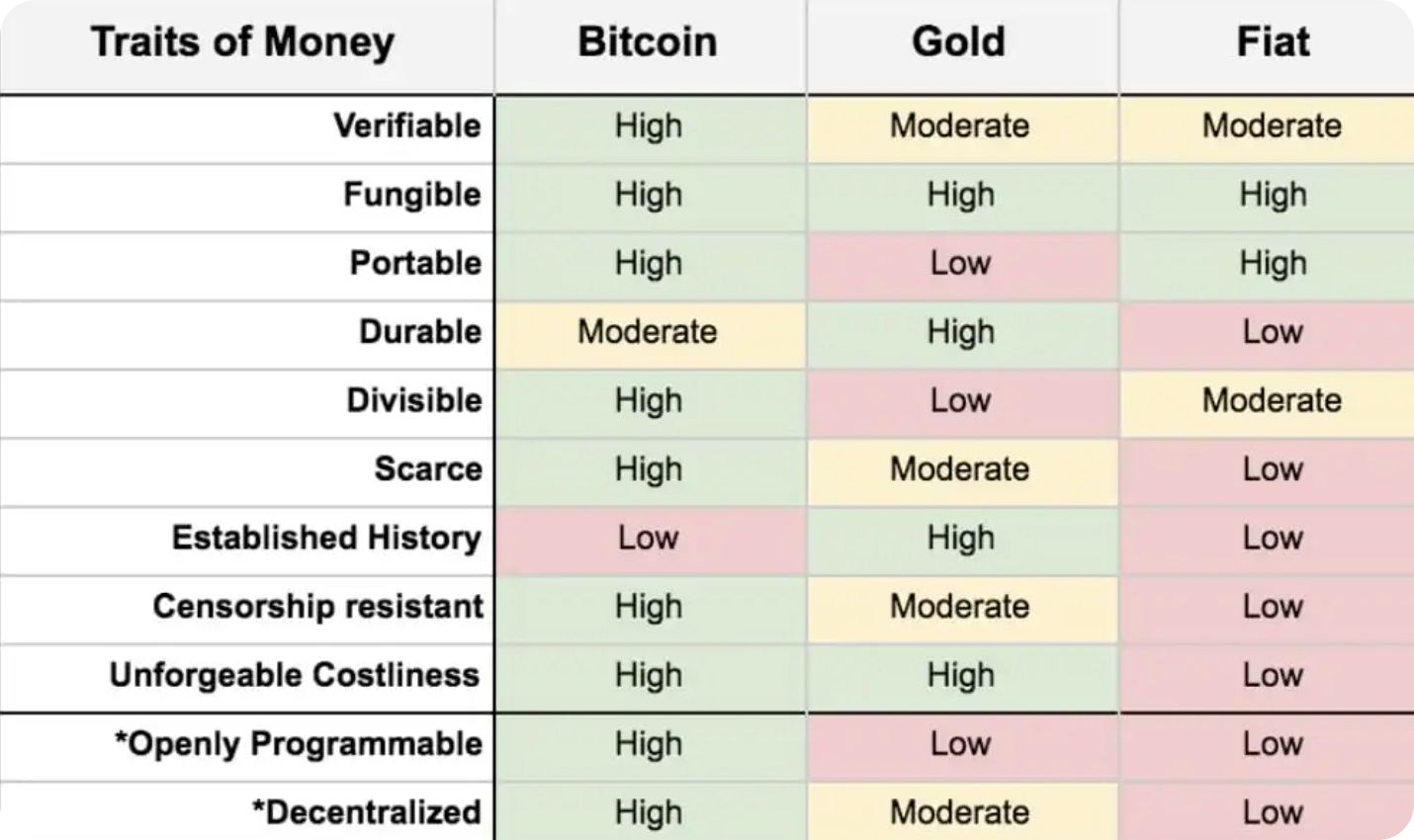 Image via medium/coinmonks
Image via medium/coinmonksWho Created Bitcoin?
If you search for "Who created Bitcoin?" you'll receive a mix of answers, so it's tricky to factually answer who created this digital currency and launched the Bitcoin Network.
According to Wikipedia, "Satoshi Nakamoto (born 5 April 1975) is the name used by the presumed pseudonymous person or persons who developed Bitcoin, authored the Bitcoin white paper, and created and deployed Bitcoin's original reference implementation. As part of the implementation, Nakamoto also devised the first blockchain database. Nakamoto was active in the development of Bitcoin up until December 2010.
"There has been widespread speculation about Satoshi Nakamoto's true identity, with a variety of people posited as the person or persons behind the name. Though Nakamoto's name is Japanese, and he stated in 2012 that he was a man living in Japan, most of the speculation has involved software and cryptography experts in the United States or Europe."
(Source: Wikipedia)
Nobody truly knows Bitcoin's creator. Still, no matter who started Bitcoin, it's undisputedly a massive global network with a loyal Bitcoin community that believes in the future of Bitcoin and prioritizes freedom, self-sovereignty, and decentralized access to a monetary system that lives outside of authoritarian control. Since its inception, Bitcoin has attracted not only retail users but also institutional investors buying Bitcoin as the new digital gold.
If you are ready to buy Bitcoin and find out "how does Bitcoin work?" let's dig in and find out more about Bitcoin.
 Bitcoin is Considered as the New Gold. Image via Shutterstock
Bitcoin is Considered as the New Gold. Image via ShutterstockAs you are diving down the Bitcoin rabbit hole, you may consider further reading interesting:
How Does Bitcoin Work?
What made Bitcoin genuinely unique was its decentralised nature. Bitcoin is not controlled or overseen by any governing bodies or intermediaries. It is distributed across a peer-to-peer network of computers. Bitcoin transactions are private and anonymous between participants.
There are no bank accounts linked to an individual's name. Some people think Bitcoin transactions' anonymity is fantastic. Others, like governments, worry about criminal activity because individual identities cannot be tracked.
Bitcoin has revolutionised how people think about money and assets and was the foundation for the public becoming interested in cryptocurrencies. Today, Bitcoin transactions are commonplace. What was once a nascent idea considered a unique but useless hobby has gradually transformed the global financial system.
Many people worldwide believe that Bitcoin will do to finance what the internet did to the information system.
If you want to buy Bitcoin or sell Bitcoin, it may seem complicated if you are new to how Bitcoin works. Many organisations accept Bitcoin payments, and cryptocurrency transactions are becoming commonplace now.
What is Bitcoin supposed to do for finance, and how will it drive financial change in the future? These are tricky questions to answer because nobody can predict the future of blockchain technology or whether it could ever replace fiat currency.
Bitcoin's price has been an exciting roller coaster since it began in 2009. Today, as many cryptocurrencies have collapsed and failed beneath the ever-changing price volatility of the crypto market, Bitcoin is still the number one listed cryptocurrency.
Cryptocurrency and Digital Assets
Although Bitcoin is called a digital currency, that could seem slightly confusing because Bitcoin is not an asset in the traditional sense. It's not even a digital asset or file on your computer. OK. So what is a Bitcoin transaction? In simple terms, Bitcoin is a transaction record showing that someone sent you something of value. It's like a digital ledger.
Bitcoin is a cryptocurrency that uses a Proof of Work (PoW) consensus mechanism. That means Bitcoin is “mined” by a computer that devotes resources (electricity and processing power) to solve a complicated cryptographic problem called a "hash problem."
What is Proof of Work?
Bitcoin uses a Proof of Work Consensus model, meaning the Bitcoin network requires Bitcoin miners to spend their computational resources to validate transactions, construct Bitcoin blocks, and mine new units of Bitcoin. Miners are node operators using computational power to solve the hash problem.
"Proof of work (PoW) is a form of cryptographic proof in which one party (the prover) proves to others (the verifiers) that a certain amount of a specific computational effort has been expended. "
"Verifiers can subsequently confirm this expenditure with minimal effort on their part. The concept was invented by Moni Naor and Cynthia Dwork in 1993 as a way to deter denial-of-service attacks and other service abuses such as spam on a network by requiring some work from a service requester, usually meaning processing time by a computer."
"The term "proof of work" was first coined and formalized in a 1999 paper by Markus Jakobsson and Ari Juels." (Source: Wikipedia)
If Wikipedia's explanation sounds too complicated, read our in-depth guide to the Proof of Work and Proof of Stakes concepts.
Alternatively, if you prefer, watch the video on the subject.
When Bitcoin began, it was easy for Bitcoin miners to validate a Bitcoin transaction and earn rewards. The Hash difficulty was 1, so Bob could set up a basic computer system with an internet connection in his garage and make a good living without frying his brain or PC.
Today, the hash difficulty is in the trillions. For example, in April 2023, the hash problem was almost 50 trillion.
The Bitcoin mining process is such that miners do not have to get the EXACT solution to the hash problem. The Bitcoin miner who gets closest to the solution receives a Bitcoin block reward. However, as the difficulty increases, so does the computational power requirements. Bob can no longer work in his garage on his PC because Bitcoin mining requires expensive, superior-quality CPU or ASIC computing.
Bitcoin is not a tangible asset, so it is tricky for many people to understand how to buy Bitcoin when it isn't a physical product. However, Bitcoin has undeniable value and can therefore be used as a currency. Like traditional currencies, you can send Bitcoin (BTC) to anyone worldwide.
If you want to send Bitcoin payments, there are some Bitcoin basics. You must first buy Bitcoin and transfer it to your secure Bitcoin wallet. Make sure you set up your digital wallet before starting.
If you are going to be buying Bitcoin, or any cryptocurrency, be sure you are using a reputable exchange. If you are looking for a step-by-step guide, we have a guide on How to Buy Bitcoin on Binance.
Some Bitcoin exchanges, such as Binance, Gate.io, and Coinbase, have self-custody wallets, or you could use a cold storage wallet like Trezor, one of the most popular offline wallets.
Once you have Bitcoin, You can send it to someone else by instigating a transaction from your wallet and public address to the recipient's wallet. This transaction is then confirmed by the miners and placed onto the Bitcoin blockchain.
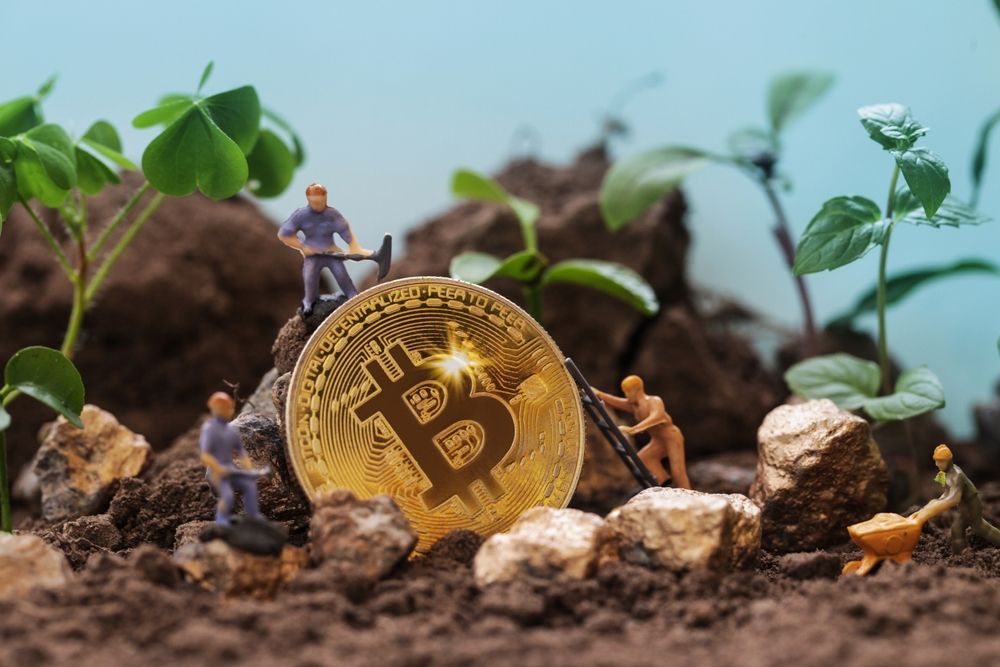 Bitcoin Miners Require Exceptional Computational Power to Mine Bitcoin. Image via Shutterstock
Bitcoin Miners Require Exceptional Computational Power to Mine Bitcoin. Image via ShutterstockThe Bitcoin Blockchain
The Bitcoin blockchain is a decentralised ledger containing all transactions on the Bitcoin network since the beginning of time. Consider it as a sizeable accounting book with numerous debits and credits. Every single transaction on the Bitcoin network can be traced on the blockchain.
The blockchain is decentralised which means that it is not stored in one particular location. True to the nature of Bitcoin, the network nodes (computers) maintain the blockchain in the Bitcoin ecosystem. That means the blockchain is public, so anyone can view transactions on the network.
You can view the latest Bitcoin ledger on a blockchain explorer like blockchain.info
The decentralised ledger is called a “chain” because all newly created blocks link to previous blocks. Using advanced cryptographic principles, each block contains data about the prior blocks. That makes Bitcoin transactions immutable, a concept that eliminates the possibility of double spending.
Bitcoin Public Addresses
As mentioned previously, Bitcoin is anonymous. There are no Bitcoin accounts where you keep your money. No one can see the identity of an individual sending or receiving money. One person can send Bitcoin to someone else on the entire network by using their public Bitcoin address.
A Bitcoin address is a string of letters and numbers generated automatically from a wallet. An example is this 1PzNiHPM9iVRd2fBpqcMv78m5pgQsag3pn
Bitcoin addresses come in several formats, but they all identify a destination for Bitcoin transactions. The most common format for Bitcoin addresses is Base58, which begins with a "1" and consists of a string of letters and numbers. Bech32 is another format that starts with "bc1" and is designed to be more efficient and error-resistant than Base58. Alternatively, there is the Pay-to-Script-Hash (P2SH) format, which starts with "3" and is used for more complex transactions.
A digital wallet is a collection of files providing access to public addresses. It is unique to each wallet you have and can be used continuously or discarded once a payment is received. When this address is created, it generates a “cryptographic key pair” composed of a private key and a public key.
The private key is known to only you, and the public key is known to the whole network (your unique public address).
To simplify further, consider your public address as your mobile phone number. You happily give that number to your contacts. However, giving your private key address would be like giving someone your login details to your bank account.
Store your private keys address safe because if someone gained access to your virtual wallet, they could transfer your digital assets to their wallets, and you would not be able to recover the losses.
You will have different private and public keys for each wallet if you have more than one Bitcoin or virtual wallet.
When you send Bitcoin to someone else, the transaction needs to be cryptographically “signed” by your private key. The public key allows the network and the miners to verify the message is signed with the correct private key.
It is important to note that no one can forge your private key. It is linked to your public key using asymmetric cryptography and hash functions. The exact explanation is beyond this initial introduction, but all you need to understand is that it's impossible to replicate the private key. Even a small change to a factor in the private key will result in a completely different public key.
Similarly, the hash function that produces the public key from the private key is a one-way function. That means you can calculate the public from the private key, but there is no way of calculating it the other way.
One more stage of algorithmic hashing occurs on your public key before it is created into a human-readable Bitcoin address. The hashing function used in Bitcoin is an SHA 256 algorithm.
If it interests you, read more about cryptographic hash functions.
Bitcoin Security: How Safe is BTC?
One of the many concerns for new Bitcoin adopters is whether the blockchain is secure. What is to stop someone from double-spending their Bitcoins? What prevents a hacker from changing a transaction in the blockchain and assigning themselves more money?
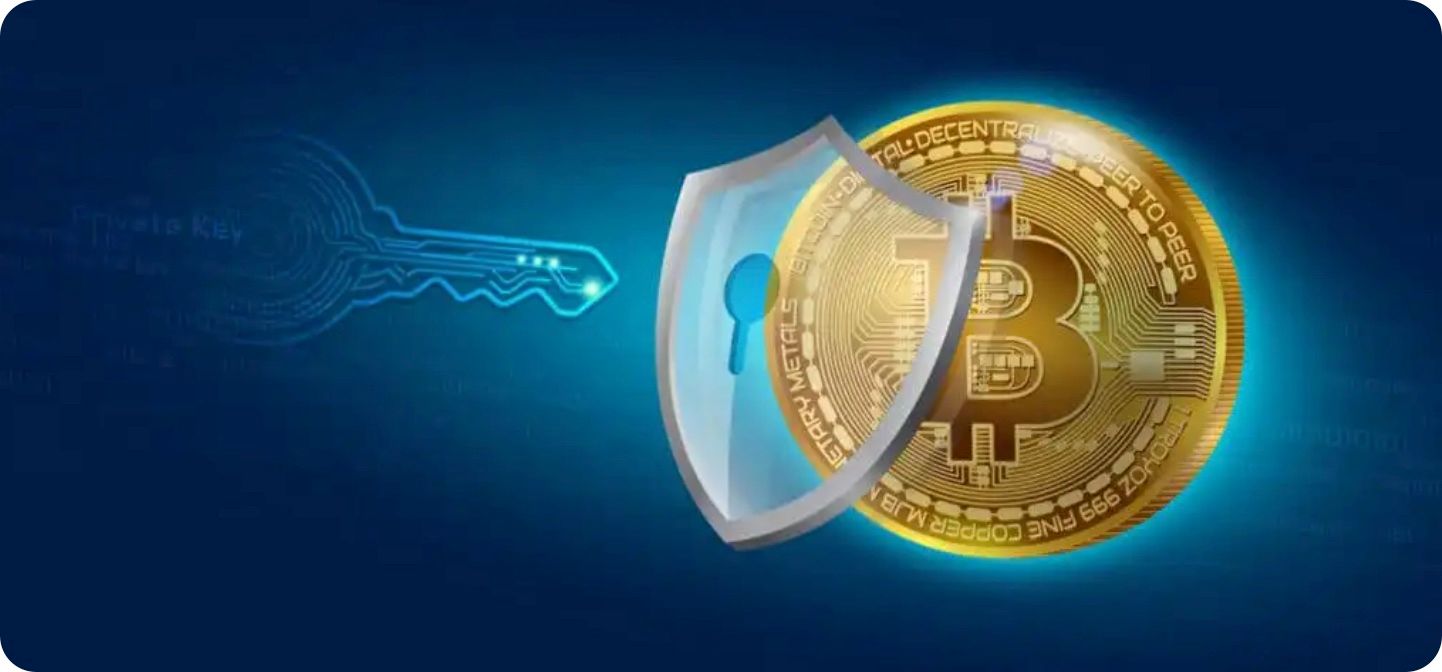 Be Sure to Keep That Bitcoin Secure! Image via Shutterstock
Be Sure to Keep That Bitcoin Secure! Image via ShutterstockOf course, security and trust go hand in hand. You cannot have a decentralised currency without all participants having 100% confidence in the network. Theoretically, the blockchain is entirely tamper-proof unless one party gains control of 51% of the network. This “rule of 51” is central to the Bitcoin protocol and was addressed in the original whitepaper by Satoshi.
In essence, if there is a disagreement about the structure of the blockchain, the network will override and choose the chain presented by the majority of the miners on the network.
With regards to a hacker being able to change a prior transaction and assign more Bitcoin to themselves, it is impossible due to the immutability of the blockchain. All blocks with transactions link to the previous blocks. This link uses a similar hashing function for the private and public keys.
Even a tiny change to a transaction in a previous block would result in a completely different blockchain than the established one. Hence, the miners would immediately notice that it's an incorrect blockchain and then revert to the one that most agree on.
People often wonder, “Is Bitcoin Safe?” We cannot predict Bitcoin's price, so we cannot know for sure from a price standpoint how future Bitcoin adoption will go. Another thing we have no control over is how safe Bitcoin will be from regulatory scrutiny. Virtual currencies like Bitcoin challenge the traditional financial system.
Governments worldwide may dislike the decentralised nature of Bitcoin transactions, and even the SEC (the U.S. Securities and Exchange Commission) is continually trying to find loopholes to make digital assets like Bitcoin reclassified as a financial security. Should that happen, it could change everything.
From a technical perspective, we know that Bitcoin is the safest and most secure asset humanity has ever created. The code that runs the Bitcoin blockchain is “set in stone,” so to speak, and with the Bitcoin mining hash rate hitting all-time highs in 2022, the unbreakable code is infallible. As the saying goes, “code is law”, and Bitcoin's code is about as trustworthy as the laws of physics or thermodynamics.
You can learn more about crypto safety and, most importantly, how to use crypto securely in our Crypto Safety 101 article.
Bitcoin Mining Process
Bitcoin acts as digital gold for some, being a store of value, while others use it as a currency, as a way to transfer value like traditional currencies. People view Bitcoin as a safe haven asset and inflation hedge that is limited in supply and hence will always be in demand.
Like gold, Bitcoin must be mined to be created. However, Bitcoin mining is done by computers that solve complicated mathematical problems using brute-force computing. Once a Bitcoin mining computer or ASIC miner has solved the hash problem, they receive a Bitcoin block reward. This point is where new Bitcoins enter the supply.
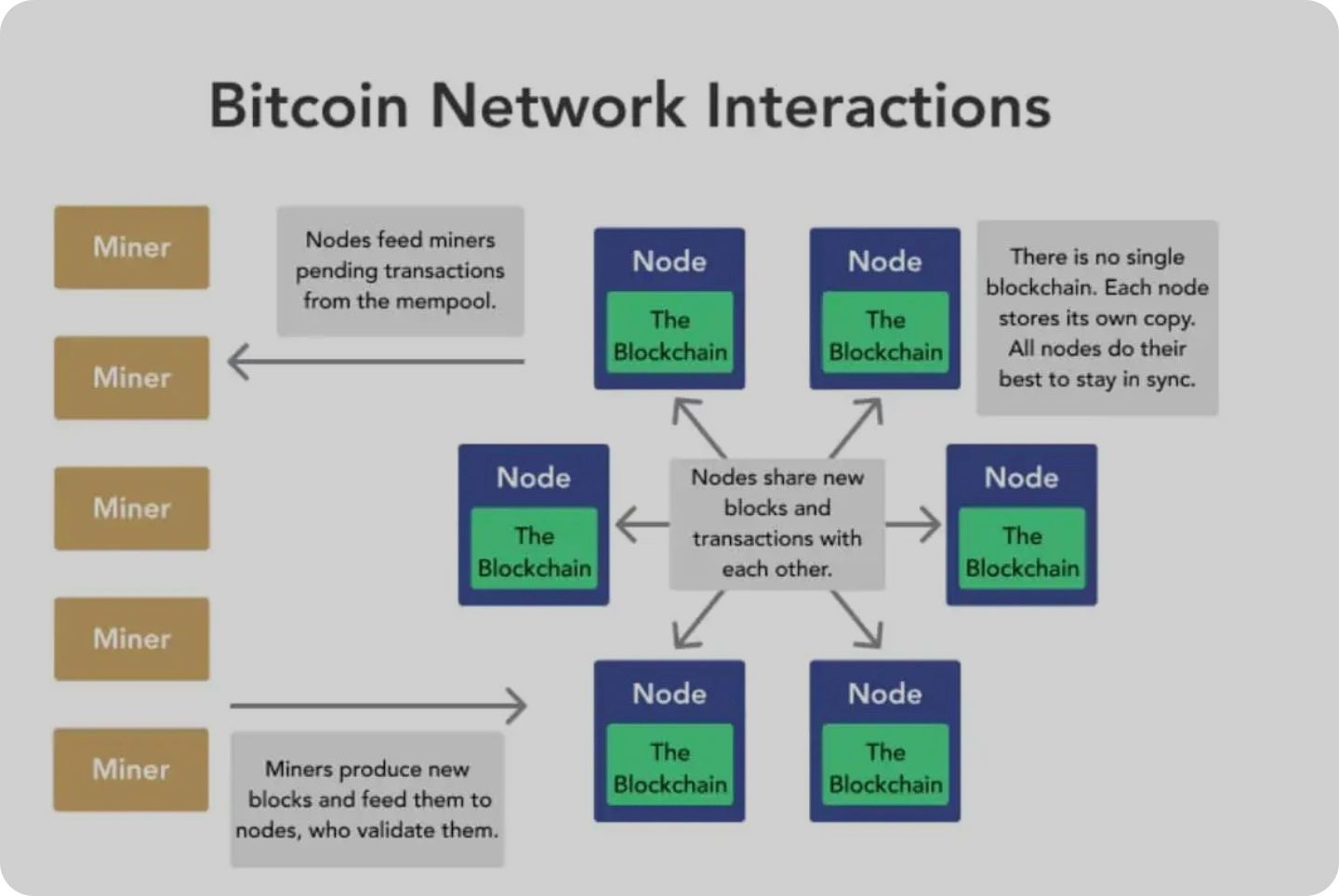 A Simplified Look at How Bitcoin Works. Image via River.com
A Simplified Look at How Bitcoin Works. Image via River.comIt is also important to note that the Bitcoin supply has a maximum limit, capped at 21m BTC. Hence, Bitcoin is naturally deflationary. The network can also regulate the amount of Bitcoin being mined by adjusting the computational difficulty of the problems. As it gets more complex, it becomes more expensive to solve the hash problems and mine the Bitcoin.
You can understand that Bitcoin mining is comparable to mining for a natural resource. For example, when first mining gold, it is at the surface and easy to pull up. As miners dig for more gold, digging deeper is necessary, which adds costs. Eventually, gold supplied to the market will begin to slow down. Only a finite amount of gold on planet Earth can be mined.
Understanding Bitcoin: What is Inside the Block?
We have mentioned the Bitcoin blocks in the blockchain without explaining how the blocks are comprised. Bitcoin blocks hold all of the transaction information for a particular period. They also contain other data, such as a timestamp (identifying when a miner picked up the transaction) and a hash of the block before. Each block has a size limit of 1MB
Given that the current block has a hash of the block before, it is inextricably linked to that block. Hence, there can be no changes to the blocks prior without changing the structure of the entire hash function.
You may also wonder how the block can contain information about all prior blocks and remain within the size limits. It works through a cryptographic discipline called Merkle trees. This subject is beyond the scope of this post, but it can effectively hash together all transactions and efficiently store them within limits.
When a Bitcoin miner validates transactions and completes a block, they receive payment in Bitcoin for solving the problem and get the transaction fees for all transactions. It is important to note that these are Bitcoin already in circulation and won't impact Bitcoin supply.
The Costs of Using Bitcoin
Whenever you want to send funds on the Bitcoin network, you must pay a fee to incentivise the miner to confirm the transactions. However, this fee is normally quite low, especially when using Bitcoin's Lightning Network. Bitcoin transactions can be sent for fractions of the cost as we see from traditional banking systems and online payment processors.
When sending money online with an online merchant such as PayPal, your fees are usually about 2-3% of the transaction amount. With Bitcoin, when you send coins, you are typically charged about 0.1mBTC (1 thousandth of a Bitcoin) per 1,000 bytes.
Considering the average Bitcoin transaction size and number of transactions, you can get an idea of the total percentage of all volume paid in fees. Bitcoin fees for using the network are about 0.760%, much lower than fiat currency transactions with PayPal (May 2023).
You may be interested in the question of international payments abroad. If you've ever had to make a SWIFT payment, you will know how long it could take and how much it costs. Usually, a range of intermediary banks can facilitate the transactions.
Payments can take anywhere from 3-4 business days. In comparison, on the Bitcoin network, average confirmation times take minutes or even fractions of a second on the Lightning Network.
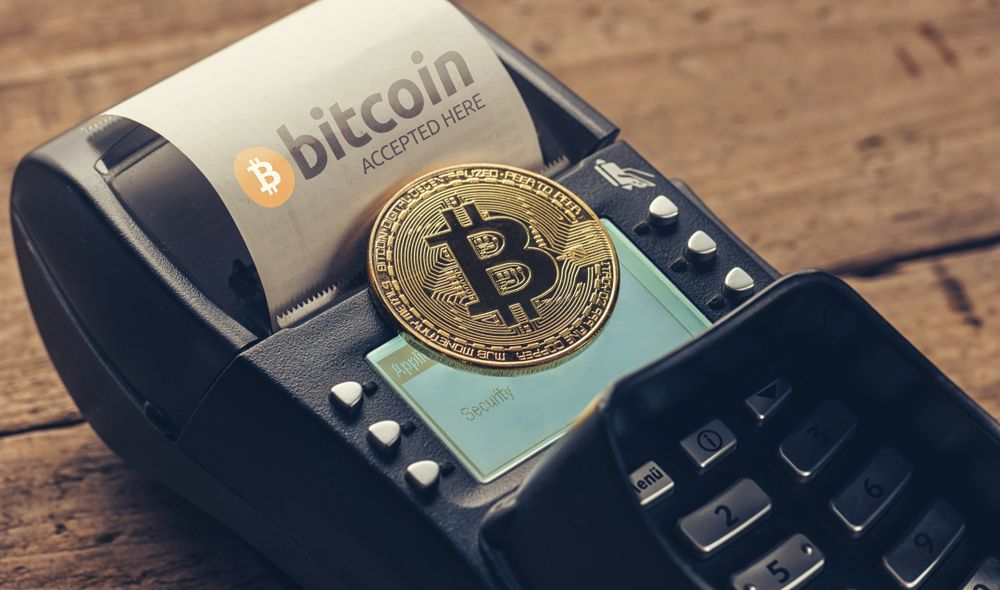 Bitcoin is Accepted Globally by Many Vendors. Image via Shutterstock
Bitcoin is Accepted Globally by Many Vendors. Image via ShutterstockHow Do You Buy Bitcoin?
Step #1: Choose a Reputable Cryptocurrency Exchange
When you are ready to buy Bitcoin (BTC), it's essential to choose a secure, established crypto exchange and one that has a user-friendly interface.
As a beginner, opting for a crypto exchange with a user-friendly interface, low fees, and robust security measures is advisable. For example, some leading platforms are Binance, Gemini, Coinbase, Kraken, and OKX.
Choose an exchange with an integrated Bitcoin wallet or open a separate digital wallet to store your Bitcoin.
There are also peer-to-peer Bitcoin platforms and non-custodial exchanges if you don't want to sign up for a centralized exchange.
Step #2: Choose a Secure Storage Solution
Many crypto exchanges offer integrated Bitcoin wallets or recommend trusted partners where you can securely store your Bitcoin. However, as most crypto exchanges are centralised, they have access to your wallet addresses by default. Therefore, you may prefer a cold storage solution, an offline digital wallet, for greater security.
To learn more about cold storage wallets, read "How do hardware wallets work?"
Step #3: Choose Your Payment Method
Before you can buy Bitcoin, you must fund your crypto exchange account. Most platforms provide payment options such as: -
- Debit card
- Bank transfer
- Cryptocurrency
- Apple Pay or Google Pay
- Skrill, and Neteller.
Step #4: Place A Bitcoin (BTC) Order
Once you have transferred funds to your account and created a digital wallet, you can buy Bitcoin (BTC). Firstly, check Bitcoin's price with the crypto exchange and then look for the ticker symbol BTC.
You don't have to purchase one Bitcoin. Instead, you can choose a monetary value. For instance, suppose you have $180 to spend, and Bitcoin (BTC) is $18,000. No problem. You can purchase $180 of Bitcoin (BTC) and would own 1% of one Bitcoin.
It's easy to find how to buy Bitcoin on most crypto exchanges as there is usually a drop-down menu for cryptocurrencies. You choose Bitcoin (BTC) and transfer it to your wallet address.
Step #5: Transfer Your Bitcoin to Your Digital Wallet
You now own Bitcoin (BTC), so the final step is to transfer it to a secure crypto wallet. Follow the transfer instructions with your chosen crypto exchange, and your Bitcoin (BTC) will quickly appear in your wallet.
What Does the Future Hold for Bitcoin
How a decentralised self-governing global currency can change how we think about the world is truly fascinating. Perhaps in the future, there may be no banks that will charge exorbitant fees. There may be no central banks that can devalue someone's money with inflation and quantitative easing.
However, when it comes to global disruption, the underlying blockchain technology has the potential to change the world. Several companies are already attempting to use a decentralised ledger to manage supply chains, raise funds through crowdfunding, improve security, and so on.
There have also been many other cryptocurrency projects that have greatly improved upon the Bitcoin protocol and include more focus on privacy, like Monero, or smart contract technology like Ethereum.
Many Bitcoin enthusiasts feel that Bitcoin may someday become the world reserve currency and the ultimate hedge against inflation and store of value. Then 2023 saw what could be considered the most significant event in cryptocurrency history since the creation of Bitcoin itself when Bitcoin developers introduced the concept of Bitcoin Ordinals, forever changing the landscape of what was thought possible with the Bitcoin blockchain.
What Are The Risks and Benefits of Investing in Bitcoin?
The Risks of Investing in Bitcoin
- Volatility: Bitcoin is known for its high price volatility. Its value can experience significant short-term fluctuations. This volatility can make Bitcoin a risky investment, particularly for the conservative and inexperienced investor.
- Regulatory uncertainty: Changes in regulations or government policies could impact the legality, taxation, or acceptance of Bitcoin, potentially affecting its value and investment prospects.
- Security concerns: While the Bitcoin network is considered secure, individual investors can be vulnerable to cyber attacks, hacking, or phishing scams. It is vital to safeguard your private keys and use reputable crypto exchanges and wallets to mitigate these risks.
- Lack of intrinsic value: Market demand and investor sentiment determine Bitcoin's price. Unlike traditional assets like real estate or stocks, Bitcoin does not have underlying assets or cash flows to establish its fundamental value.
The Benefits of Investing in Bitcoin:
- Potential for high returns: Bitcoin has previously demonstrated the potential for substantial returns on investment. Early investors made significant gains as Bitcoin's price increased over time. However, Bitcoin's historical price performance does not guarantee future returns.
- Decentralisation: Bitcoin operates on the blockchain, a decentralised network that a central authority or government does not control. Decentralisation bypasses traditional banking systems and enables borderless transactions.
- Portfolio diversification: Bitcoin's low correlation with traditional asset classes makes it an attractive option for diversifying investment portfolios.
- Global accessibility: Bitcoin allows individuals worldwide to participate in the financial arena without barriers. It enables cross-border transactions with lower fees and faster settlement times than traditional banking systems.
It's crucial to recognise that investing in Bitcoin carries risks. Its suitability as an investment option depends on an individual's risk tolerance, investment goals, and understanding of the cryptocurrency market.
It's advisable to conduct thorough research, seek professional financial advice, and invest only what you can afford to lose in such a volatile and evolving asset class.
How to Store Bitcoin Safely
Taking care of your Bitcoin is a high priority for Bitcoin holders. Here are a few suggestions: -
- Use a secure virtual wallet: Many reputable digital wallets are available to store your Bitcoin. Hardware wallets are physical devices providing offline storage and are generally considered the safest option.
- Protect your assets: Enable two-factor authentication (2FA), use strong passwords and antivirus software, and consider a firewall.
- Keep your wallet software updated: Wallet providers often release updates that address vulnerabilities and improve overall security.
- Secure your private keys: Private keys are crucial for accessing and controlling your Bitcoin. Keep them offline and securely stored.
- Avoid online storage: Where possible, avoid storing large amounts of Bitcoin in online wallets or exchanges. Even reputable exchanges can be vulnerable to security breaches and hacking attempts.
- Consider a multisig wallet: Multiple signature wallets add an extra layer of security.
- Follow the best practices laid out in our Crypto Safety 101 article.

Conclusion
Hopefully, you now understand Bitcoin (BTC) and how it works. It may seem complicated initially, but armed with this new knowledge, you'll soon speak about Bitcoin like a pro.
Bitcoin has changed the world as we know it. As the traditional finance system continues to collapse globally, interest in Bitcoin from the public and institutions continues to grow.





